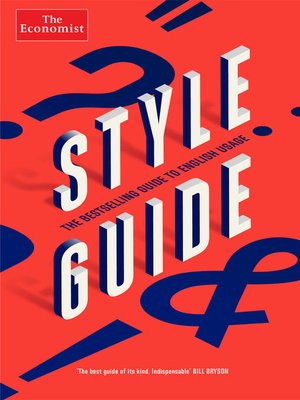
Sign up to save your library
With an OverDrive account, you can save your favorite libraries for at-a-glance information about availability. Find out more about OverDrive accounts.
Find this title in Libby, the library reading app by OverDrive.



Search for a digital library with this title
Title found at these libraries:
| Library Name | Distance |
|---|---|
| Loading... |
This expanded eleventh edition of the bestselling guide to style is based on the Economist's own updated house style manual, and is an invaluable companion for everyone who wants to communicate with the clarity, style and precision for which the Economist is renowned. As the introduction says, 'clarity of writing usually follows clarity of thought.'
The Economist Style Guide gives general advice on writing, points out common errors and clich's, offers guidance on consistent use of punctuation, abbreviations and capital letters, and contains an exhaustive range of reference material - covering everything from accountancy ratios and stock market indices to laws of nature and science.
Some of the numerous useful rules and common mistakes pointed out in the guide include:
*Which informs, that defines. This is the house that Jack built. But: This house, which Jack built, is now falling down.
Discreet means circumspect or prudent; discrete means separate or distinct. Remember that "Questions are never indiscreet. Answers sometimes are" (Oscar Wilde).
Flaunt means display, flout means disdain. If you flout this distinction you will flaunt your ignorance
Forgo means do without; forego means go before.
Fortuitous means accidental, not fortunate or well-timed.
Times: Take care. Three times more than X is four times as much as X.
Full stops: Use plenty. They keep sentences short. This helps the reader.
The Economist Style Guide gives general advice on writing, points out common errors and clich's, offers guidance on consistent use of punctuation, abbreviations and capital letters, and contains an exhaustive range of reference material - covering everything from accountancy ratios and stock market indices to laws of nature and science.
Some of the numerous useful rules and common mistakes pointed out in the guide include:
*Which informs, that defines. This is the house that Jack built. But: This house, which Jack built, is now falling down.
Discreet means circumspect or prudent; discrete means separate or distinct. Remember that "Questions are never indiscreet. Answers sometimes are" (Oscar Wilde).
Flaunt means display, flout means disdain. If you flout this distinction you will flaunt your ignorance
Forgo means do without; forego means go before.
Fortuitous means accidental, not fortunate or well-timed.
Times: Take care. Three times more than X is four times as much as X.
Full stops: Use plenty. They keep sentences short. This helps the reader.







